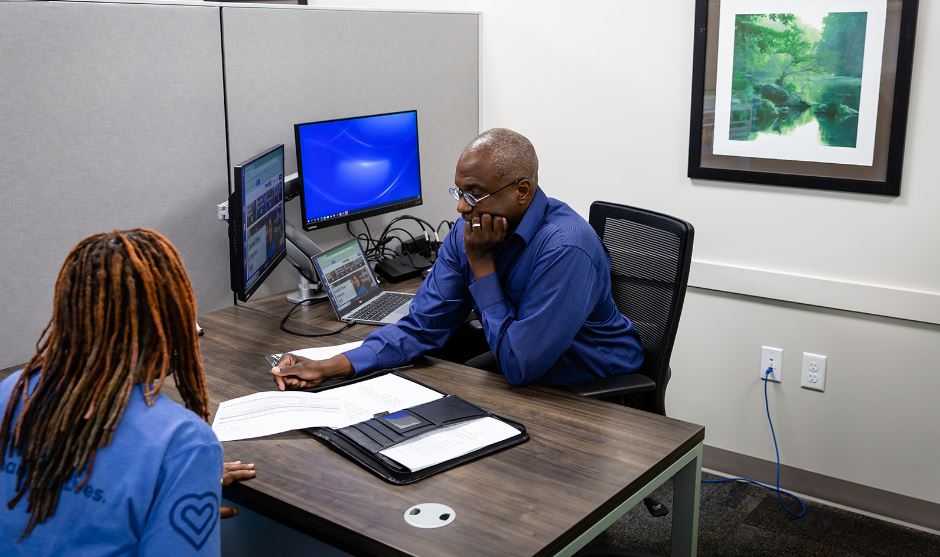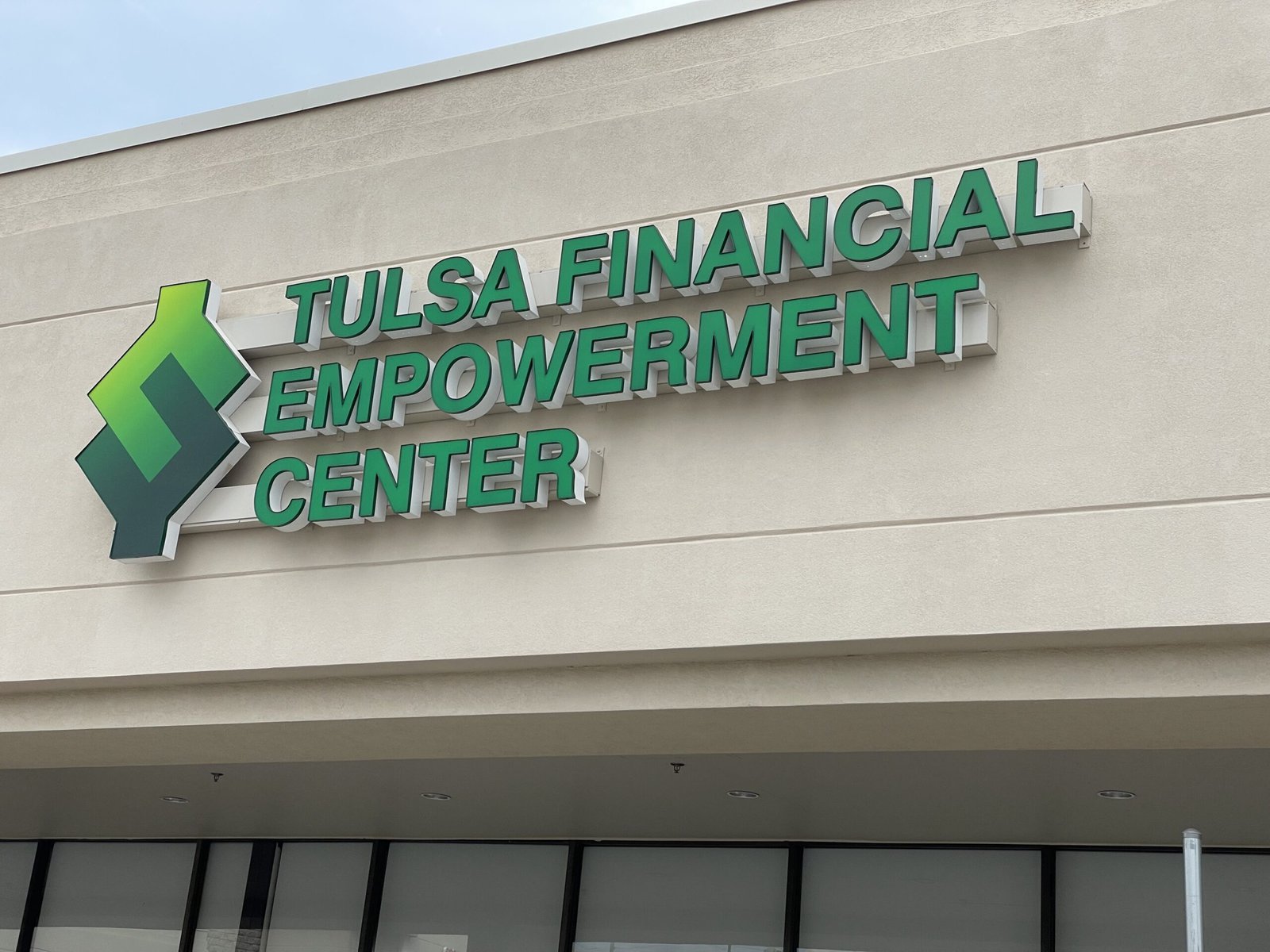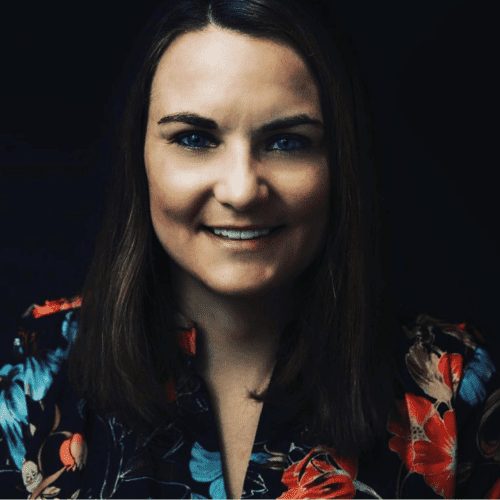In 2021, Latoya Tart found herself deep in debt. She had taken out several loans, and struggled to pay them off while still paying for other necessities, including rent and groceries.
Then Tart, 44, who works at Goodwill Industries, learned about a program offering financial counseling free of charge to any resident of Tulsa, Oklahoma. She started seeing a financial counselor at The Financial Empowerment Center in September 2021.
“I have knocked out [loans] to at least two companies,” she says. Her counselor discussed with her the best method of eliminating loans, so she started with payday loans — typically small, high-interest loans that the borrower is meant to repay after getting their next paycheck.
The Center is a partnership between the City of Tulsa and Goodwill Industries. “We are really building capacity at the city level, to support and grow and build collaboration among the providers in town who are working to move the needle on financial stability, financial resiliency for Tulsans,” says Janae Bradford, director of the City of Tulsa’s Office for Financial Empowerment and Community Wealth. The Financial Empowerment Center falls within the Office’s umbrella.

The Center offers residents the resources they need to handle several issues related to money management: banking, debt, credit and savings. Bradford says during the first session with each new client, a counselor conducts a financial health assessment.
“That’s where the counselor and the client just go through the financial situation,” she says. “How much are you making from your job? What money is coming in? What money’s going out? And it’s a completely non-judgmental, just comfortable, conversation about what are the facts.”
Then the counselor and client decide on their main focus area and set a goal. For example, in the credit category, a client might work to establish a credit score or increase an existing credit score by at least 35 points. In the savings category, goals include setting aside at least one week’s worth of income for the future or adopting new saving behaviors.
Since the Center opened in December 2020, the FEC has worked with more than 1,300 clients, and counselors have completed more than 2,000 sessions. There are currently 639 active clients working with counselors on their financial goals. Of those, 136 — or 21 percent — of the clients have achieved at least one of their stated goals.
Overall, clients with the Financial Empowerment in Tulsa have increased their savings by $241,864 and decreased debt by $646,499. In the first six months of 2022, Tulsa FEC financial counselors helped 10 clients reduce $29,000 of their combined non-mortgage debt. In the comparable period in 2023, 71 clients saw $266,000 in combined non-mortgage debt reduced.
Officials with the FEC say the average clients’ savings increases by $3,000 while debt is reduced on average by $2,400.
Tulsa’s Financial Empowerment Center and Office for Financial Empowerment and Community Wealth were created as part of the national nonprofit organization the Cities for Financial Empowerment (CFE) Fund’s Financial Empowerment City initiative.

“Since we launched the Tulsa Financial Empowerment Center, we have remained committed to embed financial empowerment resources into City services,” Tulsa Mayor G.T. Bynum said in a statement. “With the help of CFE Fund, we’re now able to have a dedicated division inside our Resilience office that carries out this vision.”
Jonathan Mintz, president and CEO of the Cities for Financial Empowerment Fund, said in a statement that the Covid-19 pandemic and ongoing recovery has underscored the role that local government must play in building residents’ financial stability.
Bradford of the Office for Financial Empowerment and Community Wealth emphasizes the FEC’s value and ripple effects across the community.
“I think having financially stable and resilient residents and a community is so important,” she says. “It affects all of us. If our neighbors are able to thrive and grow and be financially secure, it’s better for all of us, because then a more financially stable, financially secure Tulsan is reinvesting in their community.”
She notes that as communities grow, they build wealth, which then makes neighborhoods thrive. “It’s an important investment for cities to think about the overall health and resiliency of their community members,” she says.
The Center works to serve as diverse a range of community members as it can. Counselors speak a variety of languages, including Spanish and Zopau, because there is a large Zomi (an ethnic group from Southeast Asia) population in Tulsa. Bradford says they are also adding a counselor who is fluent in Dari and Pashto to support clients who are recent arrivals from Afghanistan.
Crushed by negative news?
Sign up for the Reasons to be Cheerful newsletter.“We really don’t want language to be a barrier,” says Bradford. “If there’s someone who speaks a language that we don’t have represented on our team, we will find a way to work with [them] and get that interpretation and translation provided.”
The Tulsa FEC follows a national model that has been replicated in 42 locations across the country through the Cities for Financial Empowerment Fund. Other cities that have started and sustained the FEC model include New York City, Houston and Baltimore, among other locations.
Tart, who sees her counselor about every two weeks, has eliminated roughly $3,400 in debt over her time working with the Center. But new debts keep accruing, so she’s not in the clear yet. She says it’s a lot of pressure dealing with money and debt, but she turns to her counselor and feels relief.
“They helped me know which direction I should go,” she says.








